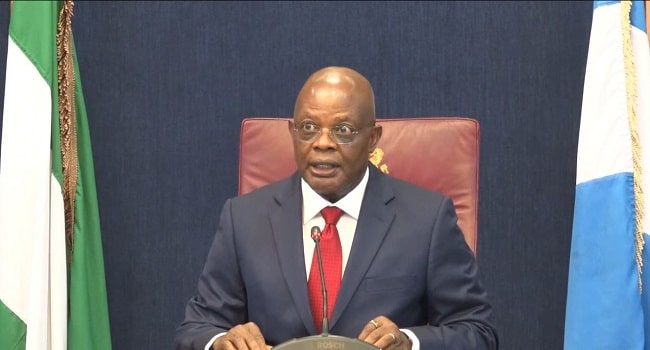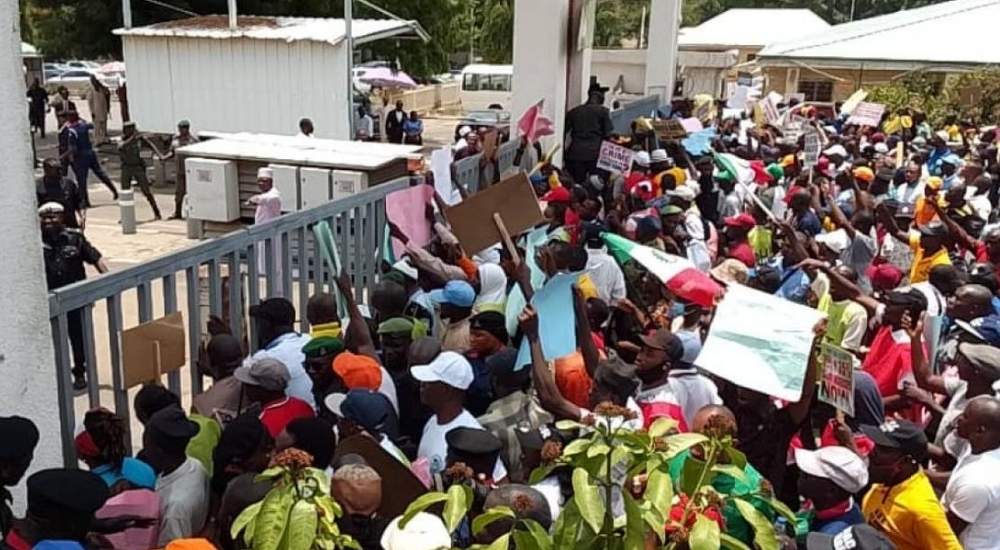
Beijing has issued a stern warning to its trading partners, urging them not to cave under pressure from the United States to isolate China amid President Donald Trumps aggressive tariff campaign. The message is part of Chinas dual strategy of outreach and retaliation aimed at countries caught in the crossfire of the escalating economic conflict between the worlds two largest economies. Responding to reports that the Trump administration is offering tariff exemptions in exchange for curbing trade with China, a spokesperson for Chinas Commerce Ministry said Monday:Appeasement does not bring peace, and compromise does not earn respect. Seeking temporary self-interest at the expense of others in exchange for so-called exemptions is like asking a tiger for its skin. In the end, it will achieve nothing and harm both others and oneself. The spokesperson emphasised that China firmly opposes any party reaching a deal at the expense of Chinas interests, warning that Beijing would resolutely take reciprocal countermeasures if such scenarios materialise. This warning follows Chinese President Xi Jinpings recent tour of Southeast Asia, where he portrayed China as a stable and committed advocate of global trade. His visits to Vietnam, Malaysia, and Cambodia were part of an effort to strengthen bilateral ties, sign cooperation deals, and distinguish China from the volatile policies of the Trump administration. As global markets reel from rising tariffs and disrupted supply chains, many nations are struggling to balance relationships with both economic giants. Trump recently paused his sweeping reciprocal tariffs on most countries for 90 days, shifting his focus squarely on China by raising tariffs on Chinese imports to a record 145%. In response, China hiked its own tariffs on U.S. goods to 125%, restricted American firms, and returned Boeing aircraft intended for Chinese carriers. According to The Wall Street Journal, the Trump administration is actively pressuring trade partners to limit dealings with China. This includes discouraging nations from serving as transit hubs for Chinese goods, blocking Chinese companies from circumventing U.S. tariffs by setting up local operations, and refusing entry to inexpensive Chinese products. Beijing, seeking to capitalize on the uncertainty, is deepening its diplomatic efforts. Chinese officials have been in contact with counterparts in Japan, South Korea, and the European Union to promote closer economic cooperation. However, the outreach is met with cautious optimism. Many nations worry about being flooded with Chinese goods diverted from the U.S. market and fear possible retaliation from Washington. Despite Xis diplomatic push, Chinas track record on coercive trade practices and regional aggression continues to spark concern. Elizabeth Economy, a senior fellow at Stanfords Hoover Institution, noted that while countries may be open to stronger trade ties with China, they remain wary. For many of these countries, even when China is a larger trading partner, the United States is often a much larger export market. So they have significant stakes with the US economy as well, she said. She also highlighted Chinas continued military assertiveness, referencing live-fire drills near Australia and New Zealand, ongoing tensions with Taiwan, clashes in the South China Sea, and disputes with Japan over the Senkaku Islands. Theyre not stepping back in terms of their security ambitions even as theyre trying to promote themselves as a stabilizing economic force, Economy added. That charm offensive needs to be more all-embracing if Xi Jinping is actually going to realize the kinds of benefits that he wants from what President Trump is doing. The post
Beijing warns Countries against colluding with US to restrict Trade with China appeared first on
Linda Ikeji Blog.

 Beijing has issued a stern warning to its trading partners, urging them not to cave under pressure from the United States to isolate China amid President Donald Trumps aggressive tariff campaign. The message is part of Chinas dual strategy of outreach and retaliation aimed at countries caught in the crossfire of the escalating economic conflict between the worlds two largest economies. Responding to reports that the Trump administration is offering tariff exemptions in exchange for curbing trade with China, a spokesperson for Chinas Commerce Ministry said Monday:Appeasement does not bring peace, and compromise does not earn respect. Seeking temporary self-interest at the expense of others in exchange for so-called exemptions is like asking a tiger for its skin. In the end, it will achieve nothing and harm both others and oneself. The spokesperson emphasised that China firmly opposes any party reaching a deal at the expense of Chinas interests, warning that Beijing would resolutely take reciprocal countermeasures if such scenarios materialise. This warning follows Chinese President Xi Jinpings recent tour of Southeast Asia, where he portrayed China as a stable and committed advocate of global trade. His visits to Vietnam, Malaysia, and Cambodia were part of an effort to strengthen bilateral ties, sign cooperation deals, and distinguish China from the volatile policies of the Trump administration. As global markets reel from rising tariffs and disrupted supply chains, many nations are struggling to balance relationships with both economic giants. Trump recently paused his sweeping reciprocal tariffs on most countries for 90 days, shifting his focus squarely on China by raising tariffs on Chinese imports to a record 145%. In response, China hiked its own tariffs on U.S. goods to 125%, restricted American firms, and returned Boeing aircraft intended for Chinese carriers. According to The Wall Street Journal, the Trump administration is actively pressuring trade partners to limit dealings with China. This includes discouraging nations from serving as transit hubs for Chinese goods, blocking Chinese companies from circumventing U.S. tariffs by setting up local operations, and refusing entry to inexpensive Chinese products. Beijing, seeking to capitalize on the uncertainty, is deepening its diplomatic efforts. Chinese officials have been in contact with counterparts in Japan, South Korea, and the European Union to promote closer economic cooperation. However, the outreach is met with cautious optimism. Many nations worry about being flooded with Chinese goods diverted from the U.S. market and fear possible retaliation from Washington. Despite Xis diplomatic push, Chinas track record on coercive trade practices and regional aggression continues to spark concern. Elizabeth Economy, a senior fellow at Stanfords Hoover Institution, noted that while countries may be open to stronger trade ties with China, they remain wary. For many of these countries, even when China is a larger trading partner, the United States is often a much larger export market. So they have significant stakes with the US economy as well, she said. She also highlighted Chinas continued military assertiveness, referencing live-fire drills near Australia and New Zealand, ongoing tensions with Taiwan, clashes in the South China Sea, and disputes with Japan over the Senkaku Islands. Theyre not stepping back in terms of their security ambitions even as theyre trying to promote themselves as a stabilizing economic force, Economy added. That charm offensive needs to be more all-embracing if Xi Jinping is actually going to realize the kinds of benefits that he wants from what President Trump is doing. The post Beijing warns Countries against colluding with US to restrict Trade with China appeared first on Linda Ikeji Blog.
Beijing has issued a stern warning to its trading partners, urging them not to cave under pressure from the United States to isolate China amid President Donald Trumps aggressive tariff campaign. The message is part of Chinas dual strategy of outreach and retaliation aimed at countries caught in the crossfire of the escalating economic conflict between the worlds two largest economies. Responding to reports that the Trump administration is offering tariff exemptions in exchange for curbing trade with China, a spokesperson for Chinas Commerce Ministry said Monday:Appeasement does not bring peace, and compromise does not earn respect. Seeking temporary self-interest at the expense of others in exchange for so-called exemptions is like asking a tiger for its skin. In the end, it will achieve nothing and harm both others and oneself. The spokesperson emphasised that China firmly opposes any party reaching a deal at the expense of Chinas interests, warning that Beijing would resolutely take reciprocal countermeasures if such scenarios materialise. This warning follows Chinese President Xi Jinpings recent tour of Southeast Asia, where he portrayed China as a stable and committed advocate of global trade. His visits to Vietnam, Malaysia, and Cambodia were part of an effort to strengthen bilateral ties, sign cooperation deals, and distinguish China from the volatile policies of the Trump administration. As global markets reel from rising tariffs and disrupted supply chains, many nations are struggling to balance relationships with both economic giants. Trump recently paused his sweeping reciprocal tariffs on most countries for 90 days, shifting his focus squarely on China by raising tariffs on Chinese imports to a record 145%. In response, China hiked its own tariffs on U.S. goods to 125%, restricted American firms, and returned Boeing aircraft intended for Chinese carriers. According to The Wall Street Journal, the Trump administration is actively pressuring trade partners to limit dealings with China. This includes discouraging nations from serving as transit hubs for Chinese goods, blocking Chinese companies from circumventing U.S. tariffs by setting up local operations, and refusing entry to inexpensive Chinese products. Beijing, seeking to capitalize on the uncertainty, is deepening its diplomatic efforts. Chinese officials have been in contact with counterparts in Japan, South Korea, and the European Union to promote closer economic cooperation. However, the outreach is met with cautious optimism. Many nations worry about being flooded with Chinese goods diverted from the U.S. market and fear possible retaliation from Washington. Despite Xis diplomatic push, Chinas track record on coercive trade practices and regional aggression continues to spark concern. Elizabeth Economy, a senior fellow at Stanfords Hoover Institution, noted that while countries may be open to stronger trade ties with China, they remain wary. For many of these countries, even when China is a larger trading partner, the United States is often a much larger export market. So they have significant stakes with the US economy as well, she said. She also highlighted Chinas continued military assertiveness, referencing live-fire drills near Australia and New Zealand, ongoing tensions with Taiwan, clashes in the South China Sea, and disputes with Japan over the Senkaku Islands. Theyre not stepping back in terms of their security ambitions even as theyre trying to promote themselves as a stabilizing economic force, Economy added. That charm offensive needs to be more all-embracing if Xi Jinping is actually going to realize the kinds of benefits that he wants from what President Trump is doing. The post Beijing warns Countries against colluding with US to restrict Trade with China appeared first on Linda Ikeji Blog.  Like
0
Like
0
 Dislike
0
Dislike
0
 Love
0
Love
0
 Funny
0
Funny
0
 Angry
0
Angry
0
 Sad
0
Sad
0
 Wow
0
Wow
0

















